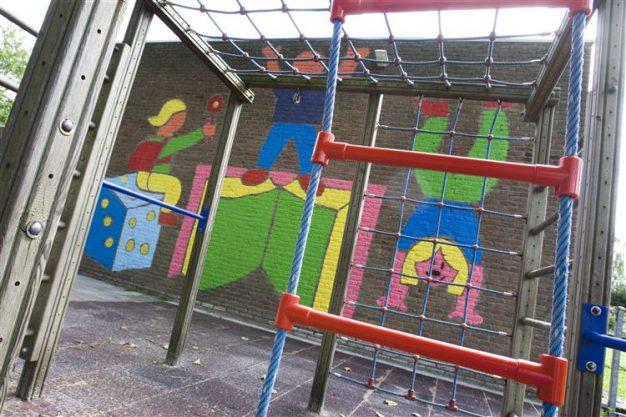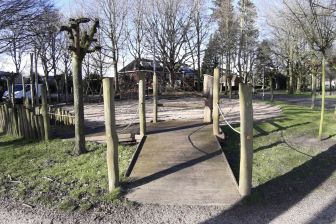
Children feel happier in imaginative play spaces
It is widely acknowledged that it is important to let kids take charge of their own play. According to their wishes, the children living in Tilburg, a city in the Netherlands, now enjoy living in neighbourhood painted with colours.
Public playgrounds are often critisized for not corresponding to children’s needs for outdoor play areas. Consequently, child experts organisations emphasise the importance of taking a much more holistic, imaginative and collaborative approach to the design of play space, which leads to much happier and healthier children.
Early childhood educators emphasize how important is that kids can take charge of their own play.
The “empty playground” problem
There are 206,234 residents and over 2000 children under the age of 18 living in the district Stokhasselt in Tilburg. There is plenty of space and opportunities for playing outdoors. However, the play areas are often abandoned and many of these playgrounds lack inspiration and does not motivate children to play.
Miranda Verburg, Project Manager working at a non-profit organisation Jantje Beton, spealizing in activities promoting children’s freedom to play, said: “Many playgrounds are unimaginative and therefore unattractive and boring. The streets are unsafe dominated by traffic and the public parks and gardens are not fit for play either.”
Verburg, who presented the project “Jantje Beton’s approach to play” explained that the identified areas for outdoor play present every opportunity for creating more stimulating and more lively play areas that encourage play.
“Playing outdoors is important for the development of children. It is also a lot of fun! And the well-being of chidren in the neighbourhood will be ensured if steps are taken to make the community safe for outdoor play.”
Beautifying their neighbourhood
Years of research show conclusively that child-directed play fosters the development of the children’s cognitive, social, emotional, and physical skills and contributes to school success.
In response to this, children who participated in the initiative led by Jantje Benton, were asked to describe their feelings about their favorite playground.
“What we found is that although the children think playgrounds are fun, they were dreaming of living in a neighbourhood that is more colourful and more vibrant. Since we wanted to fulfill the dreams and wishes of the children, Jantje Beton and the municipality of Tilburg made two huge wall paintings with a surface of 360 square meters,” said Verburg.
The paintings for the walls included elements from the children’s drawings that were entered into a drawing contest about their preferred playground, organized by Jantje Beton.
The completion of the project was achieved through a collaborative approach from residents and businesses in the community. Volunteers, who were supervised by professional designers, from the neighbourhood participated in painting the walls. Local businesses provided the majority of the materials for free and the housing corporation provided funds and manual power. The work was completed within less than three weeks.
“Everyone in in the neighbourhood feels very excited and part of the project. Both children and adults share the feeling that the paintings belong to them,” said Verburg, who presented this initiative at the Child in the City Congress in Croatia.
“In essence our approach is based on involving children when designing public areas. We also emphasize how an outdoor play that is dull and uninteresting to children can be transformed through much more creative and artistic ways.”
About Jantje Beton
Jantje Beton lets children play outdoors.
Hiding in the bushes, messing around with water, building huts… What’s more fun than playing outdoors? But often the place to play is not within easy reach and doesn’t stir the imagination.
Jantje Beton thinks that children should be able to go outside and play whenever they please. Therefore we support the development of projects that encourage children to play freely, for instance, by subsidizing actual projects, sharing knowledge, taking part in forms of co-operation and sticking up for the interests of children playing outdoors.
Jantje Beton was established as a National Youth Fund in 1968 and is independent of government money. Queen Beatrix is our patroness and many children are involved in our annual lottery and collections.
Jantje Beton have 25 employees and its headquarters are in Utrecht.
For more information please visit the website: www.jantjebeton.nl




